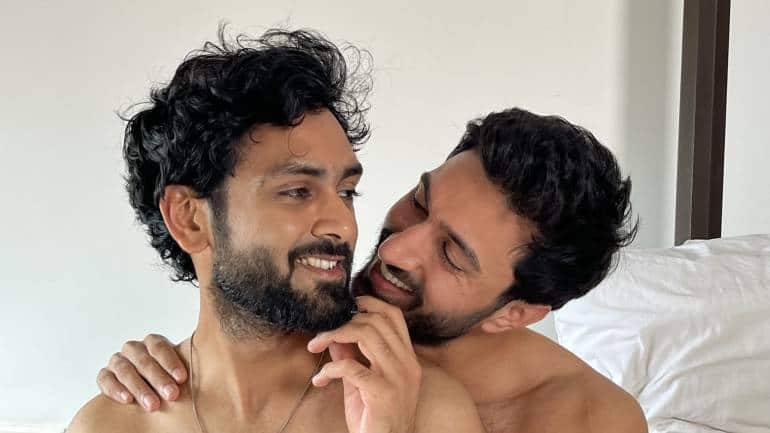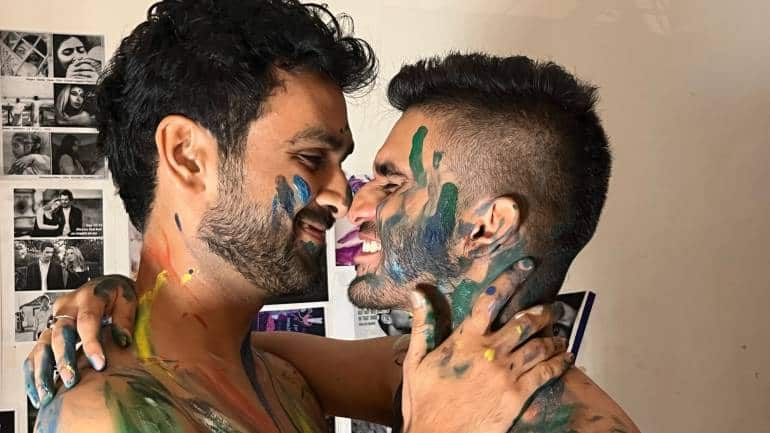Filmmaker Onir
National Award-winning filmmaker Onir’s Pine Cone is all set to be shown as the opening film of the 14th edition of Kashish Mumbai International Queer Film Festival on June 7 at Mumbai’s Liberty Cinema. South Asia's biggest LGBTQ+ film festival will see the screening of 127 films from 45 countries, out of which 110 films from 41 countries will play at the on-ground edition at Liberty Cinema and Alliance Française de Bombay. There will also be panel discussions, performances by the queer community and allies, workshops, interactive sessions and a film pitching session for LGBTQ+ filmmakers to make their next short film. The festival will close on June 11 with the Canadian feature film When Time Got Louder, directed by Connie Cocchia, who identifies as an LGBTQ+ director, producer and writer.
For Onir, having the world premiere of his film at Kashish 2023 is a moment of pride as the film he had planned to make originally — titled We Are — was denied an NOC for wanting to depict a gay Army officer as it would have have shown the armed force in “poor light” and raising “security issues”.
 A still from Onir's 'Pine Cone', which is the opening film of the 14th edition of Kashish Mumbai International Queer Film Festival.
A still from Onir's 'Pine Cone', which is the opening film of the 14th edition of Kashish Mumbai International Queer Film Festival.
The filmmaker tells us that Pine Cone happened because We Are didn’t. Edited excerpts:
Can you recall how Pine Cone came about?
A large part of 2021 went in dealing with the anger and the frustration that followed after I was denied permission to make We Are. That is when I thought of making another film that celebrates queer identity on various levels. I can very proudly say that no other (mainstream) film has done it. I see most gay films being made by cis-gender men and women who are still grappling with acceptance. I wanted to make a film that goes beyond acceptance — which is our story — because our lives are not on hold because the straight world is still learning how to accept us.
What is Pine Cone about?
It is a journey of a gay filmmaker over two decades. The film starts in 1999 when he has graduated from school and has his first love affair. This part of the film was shot in Sikkim. It is set in 1999 when the first gay pride parade happened in India. Then it’s 2009 when the Delhi High Court had decriminalised homosexuality. That part of the film is set in Mumbai when my character is trying to become a filmmaker and also exploring his life through chat rooms and going out. This is when he has his second love affair. Cut to 2019 which is one year after the Supreme Court of India’s verdict of decriminalising homosexuality. This part I shot in Cochin. This is when he is an established filmmaker and he falls in love for the third time. So, the film is the love story of a gay man navigating through life and how society is changing, but it is also talking about how far it is truly changing. The film is not about the heterosexual world’s acceptance or non-acceptance. Most of the characters in the film are gay, so it kind of celebrates queer gaze, queer people and queer desire because I feel that very often when the latter is portrayed in films/shows, it is done hesitantly. I wanted to put it out there that there is nothing dirty in portraying queer intimacy or desire.
Is the film semi-autobiographical then?
Yes, because I was also working on my biography at the time and I took some incidents and weaved them in the film.
This is also the first time that there is a queer person playing a gay character on screen. Can you take us through the auditioning process?
It was actually accidental. There is an entire discourse that one should empower queer people to play queer roles. At the same time, we talk about the fact that because of society, it’s difficult for queer people to step out and be open about their sexuality. Even when I cast, I cannot morally or ethically ask people about their sexuality as it can be misconstrued. I can ask people about their gender, though. For me, there are no two ways about the need to cast a transgender person as a trans character. For instance, for the second story I have cast Sushant Digvikar as a trans character and there are many other trans characters in the film with no cis-gender men or women playing those roles.
 A still from Pine Cone.
A still from Pine Cone.
When I was auditioning, Vidur Sethi was one of the actors who was shortlisted from Delhi. We were doing a video call where I wanted to brief him for the final test. I was telling him that I don’t want to sensationalise the intimacy portions and he said he understood, because he is also queer. It was so nice that it came from him and not because I asked. He was already in the final shortlist and I loved his performance. Pine Cone is definitely one of the very few and probably one of the first mainstream Hindi films to have an out and proud queer actor playing a gay role.
How significant do you think that is?
I really want to empower the queer community. And I really hope that my industry, which never celebrated My Brother Nikhil or I Am, learns to celebrate Pine Cone which is a groundbreaking film in terms of queer narratives.
From My Brother Nikhil to now, has your depiction of the LGBTQ+ community changed?
Absolutely. My Brother Nikhil was about a family’s acceptance and that is the difference I bring in, in terms of queer gaze. When the family rejects Nikhil, he does not beg for acceptance. It is his father who acknowledges him and his boyfriend and brings him back home. It was an honest gay character. That was in 2005. In 2011, my film I Am dealt with gay characters and how the police used to sexually abuse them and what the law did to us. 2017’s Shabd was a hetero-normative story but multiple queer characters were just living their lives. Pine Cone is an absolute celebration of queer lives. It is a story which has come from a pure place and I have said it without thinking who is the audience or who will be comfortable or uncomfortable with it.
Are you looking to release it in theatres or on a digital platform?
Looking at how the last few films have fared in theatres – and I am talking about some really good films – it is heart-breaking to see that people are not going to the theatres. Pine Cone is the opening film at Kashish and I want to be pleasantly surprised by a (digital) platform that tells me that they want my film instead of me having to pitch for it. It is Pride Month and a crucial juncture in the history of Indian queer rights movement where we are discussing same-sex marriage. After the film festivals, I’m quite happy going straight to the platforms.